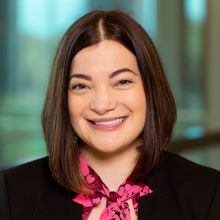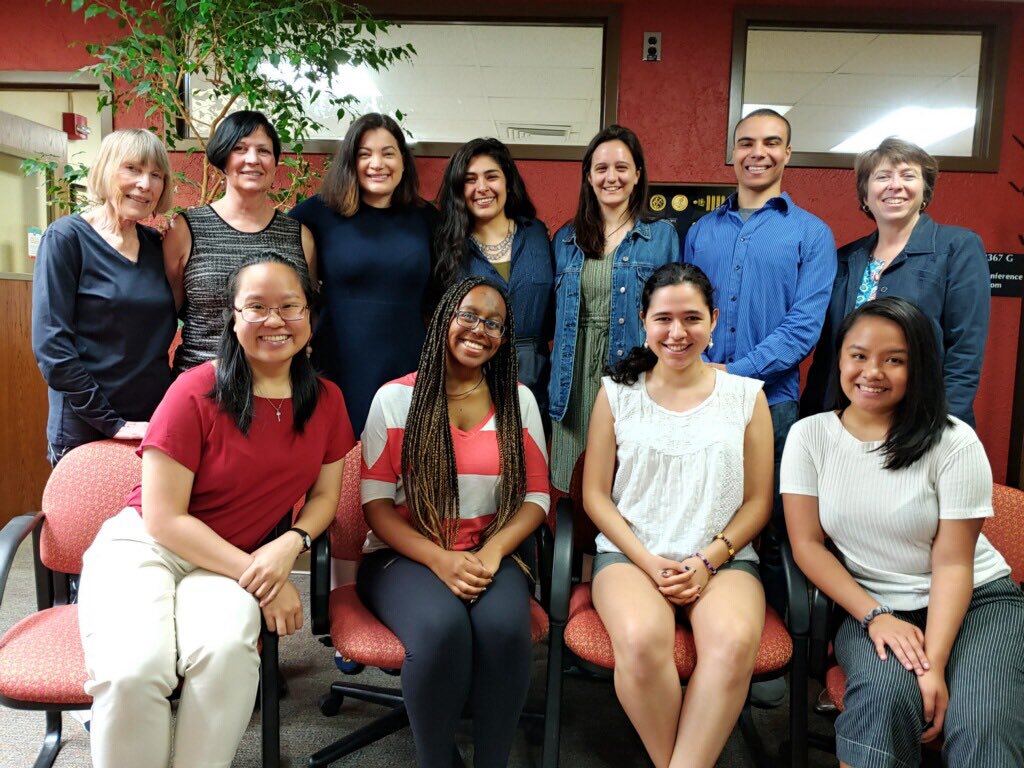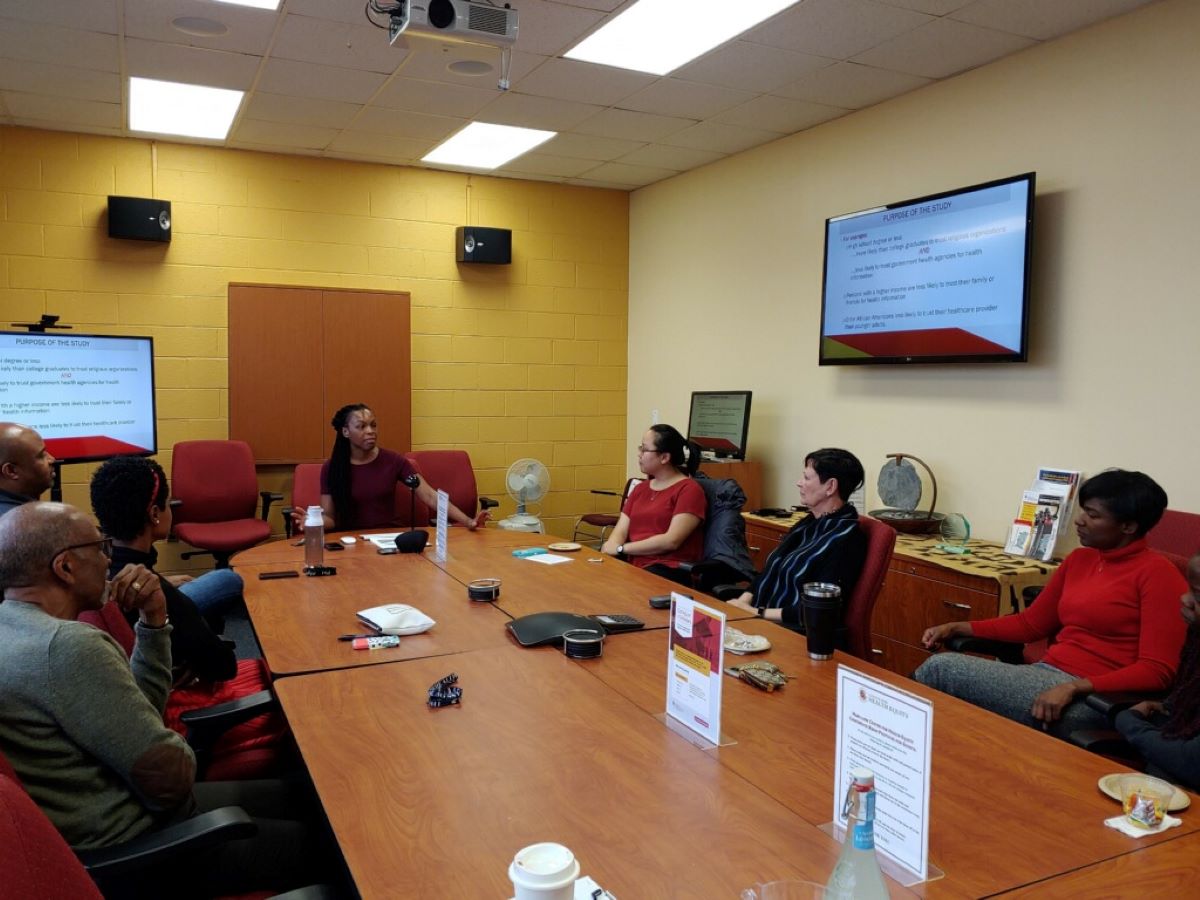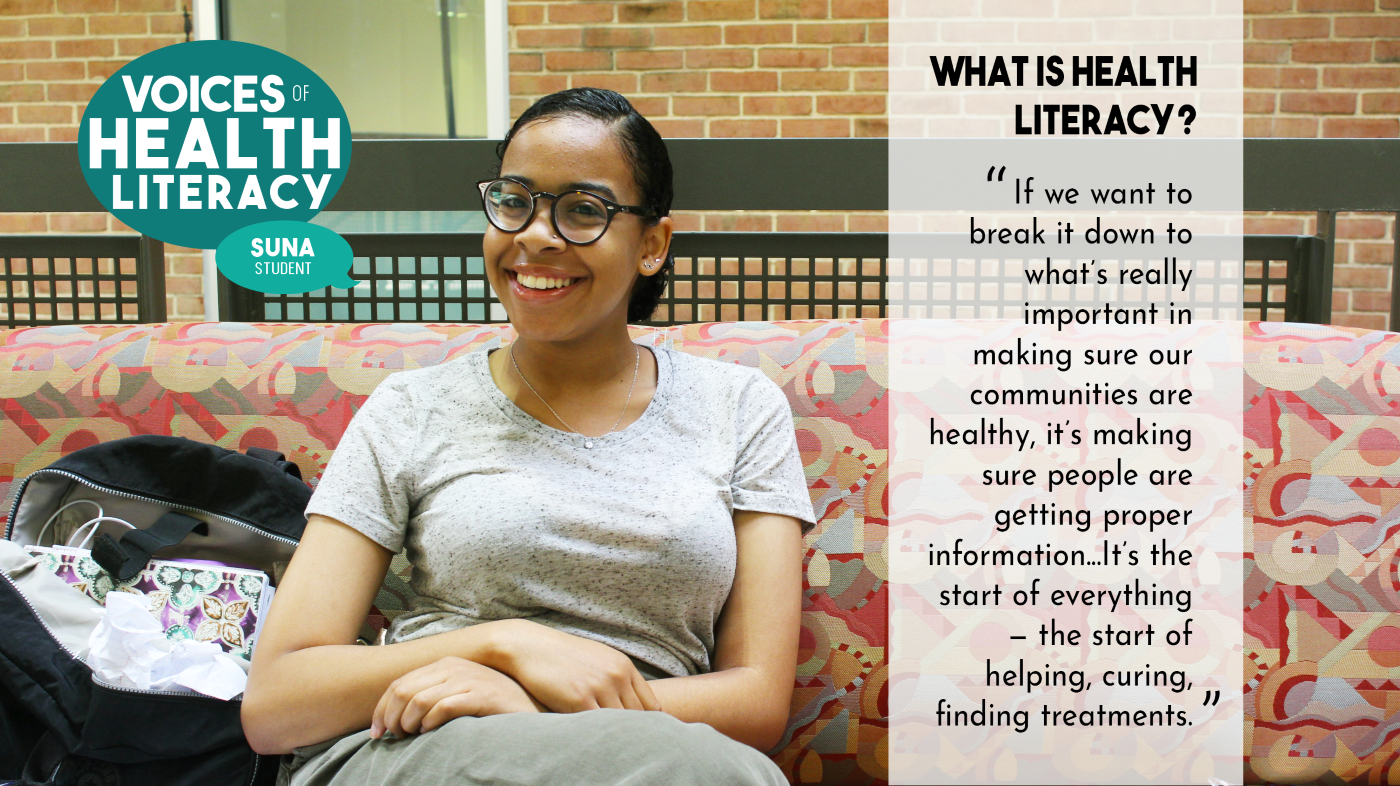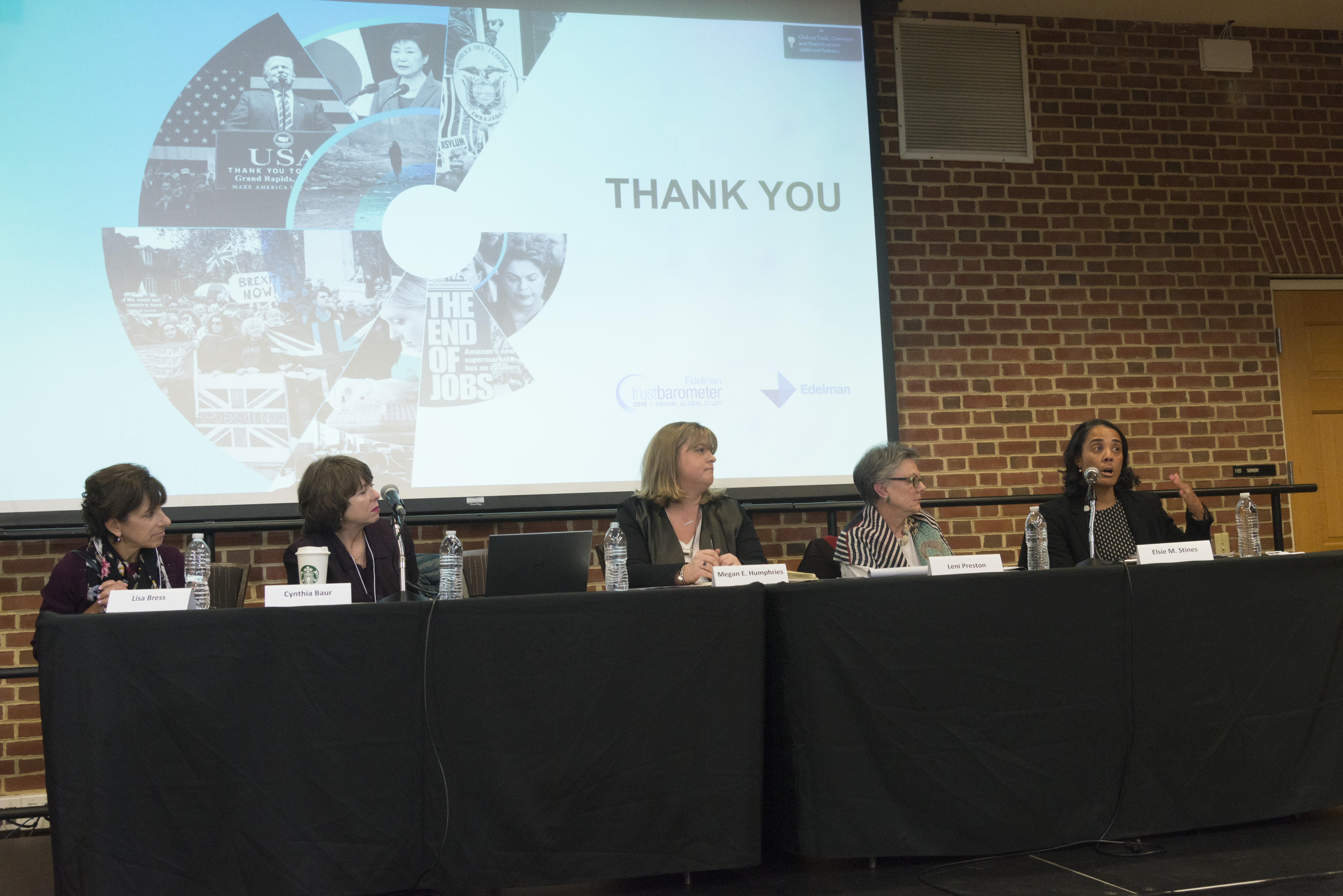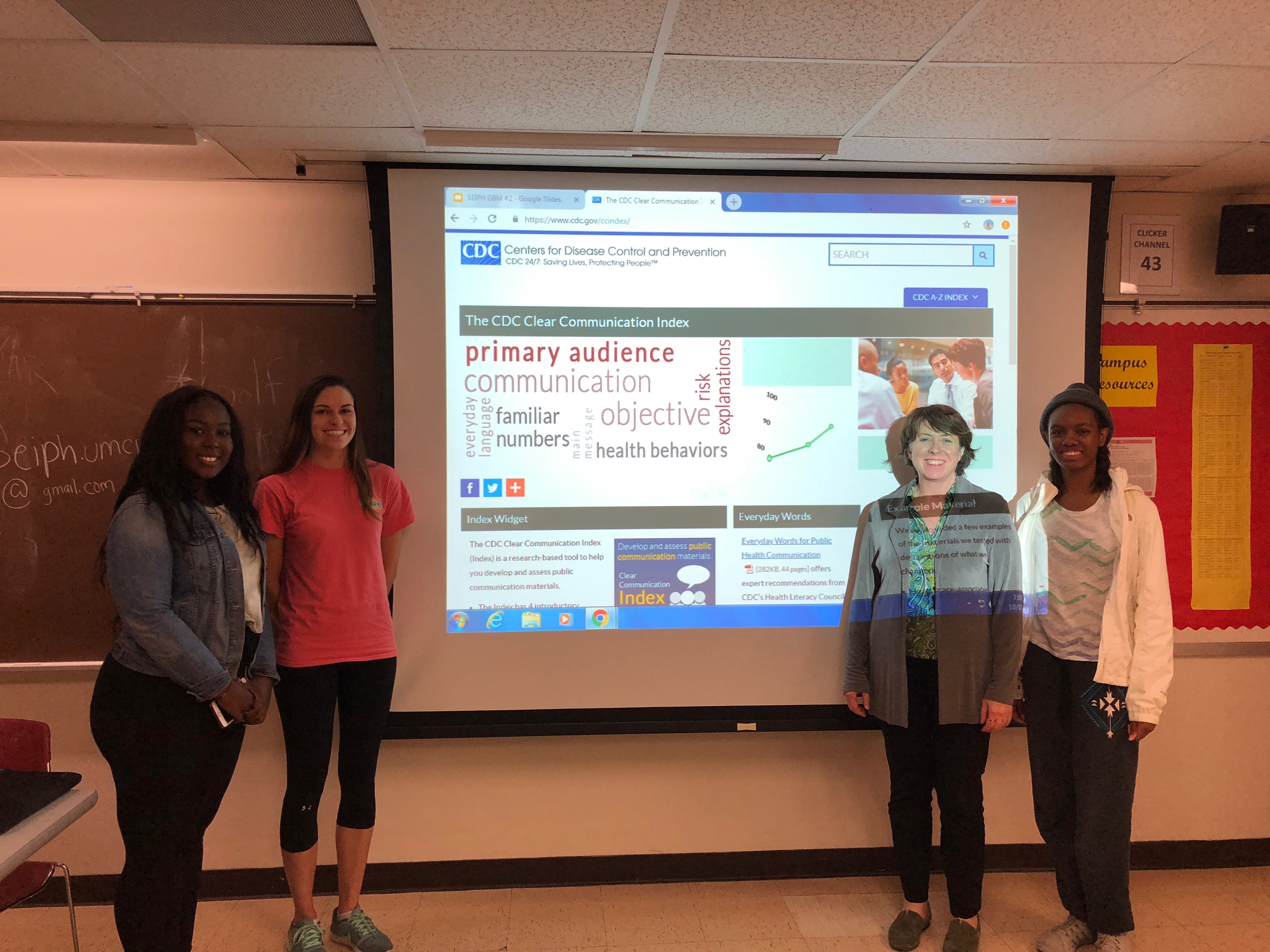Year in Review
Check out the annual highlights of our research, education, and outreach activities!
The Horowitz Center for Health Literacy had a fantastic year with our partners and the Maryland Consumer Health Information Hub. We continued to develop and offer training and work on organizational health literacy, digital health literacy, and health literacy and public health emergency preparedness. We also supported state and local partners to implement plain language in their communications and materials about health. 2026 will be even busier, and we invite you to join us!
Maryland Consumer Health Information Hub
Created by a 2022 Maryland law, the Hub is a network of organizations and people increasing plain language and language access for health, safety, insurance, and social services information in Maryland.
2025 highlights include
- Promoting Hub tools, including the Maryland Plain Language Checklist and the Plain Language and Language Access Action Planning Guide
- Launching the Maryland Health Literacy Organizational Seal program
- Sharing best practices and successes in monthly webinars
- Running the “Why Health Literacy Matters” multilingual Facebook campaign during Health Literacy Month in October
Hub team members attended Local Health Improvement Coalition (LHIC) meetings to understand community needs and present on the Hub's activities, resources, and support. The Hub team provided training and technical assistance to state and local agencies and organizations.
We offered multiple plain language workshops to state agencies, local health departments, and non-profit organizations. The workshops help organizations build the skills and capacity to create materials that are easy to understand. We also offered plain language reviews of health, safety, insurance, and social services materials from state and local organizations using the Maryland Plain Language Checklist.
The Maryland Health Literacy Organizational Seal program was created to recognize state and local agencies that prioritize clear, accessible communication with the public. It highlights organizations that have embedded health literacy principles, plain language standards, and equitable communication practices into their daily work. The Seal not only acknowledges agencies for their efforts to make health information more accessible, but also encourages ongoing improvement in how information is shared with the communities they serve.
The Horowitz Center promoted Health Literacy Month in October by running a multilingual "Why Health Literacy" digital campaign. The content was posted on the Center’s Facebook page and had new content for each weekday during the month. Check out our partners’ perspectives on why health literacy matters to them.
Our Ongoing Work
Head Start Early Childhood Programs: Health Literacy Guiding Principles to Implement Health Equity
The Horowitz Center and Head Start’s National Center on Health, Behavioral Health, and Safety (NCHBHS) developed health literacy guiding principles to help Head Start early childhood programs, a vital program for families with young children, put health literacy into practice.
We used the principles to develop health literacy toolkits for Head Start’s key program areas. The family toolkit helps families find accurate health information they can understand and use it to engage with healthcare providers and manage their health. Other programs can learn from and apply these principles, too!
Pandemic Readiness
Dr. Cynthia Baur, the Horowitz Center and Hub Director, continued to co-lead UMD’s Pandemic Readiness Initiative. This is a UMD-supported faculty and student research collaboration on the information and communication dynamics that shaped the COVID-19 pandemic, as well as research to anticipate and inform future pandemic preparedness and response.
Maryland Plain Language Initiative
The Horowitz Center is a member of the Plain Language Initiative Community of Practice established by the Maryland Governor’s Executive Order in 2024. The purpose of the Plain Language Executive Order is to enhance the accessibility of all written communication produced by State agencies. The Community of Practice is developing tools to help assess current web content, training state employees in plain language best practices and supporting agency pilot projects to implement plain language using Maryland’s Plain Language Standards.
Education and Training
The Horowitz Center released an online, on-demand health literacy training series for Community Health Workers (CHWs) hosted on the University of Maryland Open Learning Platform. The course introduces CHWs to the fundamentals of health literacy and helps build the knowledge and skills needed to effectively support community members in understanding and using health information and available services.
We also created a training for consumers called Good Questions for Good Health. The one-hour session, adapted from the CDC’s Good Questions for Good Health, is designed to help adults confidently communicate with healthcare providers and includes activities and discussions. We delivered this training to several CHW and non-profit organizations.
The Center developed the Health Literacy Education Toolkit to support educators in colleges, universities, and professional development programs to learn and teach the skills to effectively communicate health information for all audiences. The Toolkit content is relevant in undergraduate and graduate programs in public health, medicine, nursing, pharmacy, dentistry, and social work. The Toolkit also includes health literacy training for Community Health Workers and clinicians, and a Health Literacy Badge for Undergraduate students.
We developed and taught a new undergraduate course, Global Health Literacy. The course introduces students to the concept of health literacy and guides them in developing the knowledge and skills to consider health literacy, evidence-based strategies, and practices to improve the health of global communities and populations.
Maryland Plain Language Initiative
The Horowitz Center is a member of the Plain Language Initiative Community of Practice established by the Maryland Governor’s Executive Order in 2024. The purpose of the Plain Language Executive Order is to enhance the accessibility of all written communication produced by State agencies. The Community of Practice is developing tools to help assess current web content, training state employees in plain language best practices and supporting agency pilot projects to implement plain language using Maryland’s Plain Language Standards.
Gatherings
Maryland Consumer Health Information Hub Convenings
On March 12th and March 26th, 2025, the Hub hosted two regional convenings in College Park, MD, and Cambridge, MD, bringing together state and local partners for a day of learning and collaboration. Each convening featured panels on plain language and accessible website design, as well as advancing language access in Maryland.
Speakers highlighted best practices, statewide resources, and the challenges communities face when navigating public health information. Attendees participated in hands-on work with the Plain Language Action Planning Guide, where attendees explored strategies for integrating plain language principles into their own organizations and reviewed tools to refine their communication efforts.
A table networking session followed, where participants exchanged ideas, shared challenges, and developed actionable solutions to make health literacy a priority in their communities. Both events ended with reflections on improving local implementation of plain language, language access, and information accessibility.
Presentations
The Hub team presented on plain language, health literacy, language access, and other topics throughout the year. Some of the special presentations include
- Dr. Cynthia Baur presented a poster on the CHW health literacy training at the 2025 American Public Health Association (APHA) Conference in Washington, DC., November 2025.
- Dr. Cynthia Baur presented on health literacy as a foundational principle for interprofessional education in health professions at the virtual national Interprofessional Education Collaborative in November 2025.
- Dr. Catherine Maybury presented at the Healthy Saint Mary’s Partnership annual meeting on how plain language can advance the organization’s strategic plan and priority health issues in September 2025.
Students
Graduations
Cailin Trembley completed her capstone project on oral health, recovery, and health literacy with the project, The Intersection of substance abuse recovery and oral health barriers, beliefs, and solutions. Her community partner was All Paths, a peer recovery organization in Cecil County, Maryland. Cailin developed tailored oral health education materials and resource lists for an organization that supports individuals in substance use recovery. Drs. Cynthia Baur and Catherine Maybury were on her capstone committee and Cailin’s degree is from the Department of Behavioral and Community Health.
Omobolanle (Bola) Kushimo defended her doctoral dissertation, The Development of Health Literacy among second generation Nigerian Americans. This interview-based study with Nigerian American young adults examined how they learn and communicate about health topics, search for health information, and use mass and social media channels. Dr. Cynthia Baur chaired the dissertation committee, and Bola’s degree is from the Department of Behavioral and Community Health.
New Students
The Center welcomed a new doctoral student who is receiving one of the Center’s health literacy research fellowships. We are so glad to expand the Center’s educational mission!
Hasmin Ramirez-Villegas, MPH, is a Health Literacy Doctoral Research Assistant at the Horowitz Center for Health Literacy. She received her MPH in Epidemiology from George Washington University Milken Institute School of Public Health, with a focus on HIV/AIDS and infectious diseases. She investigates how language proficiency and health literacy influence behavior and impact health inequities among underrepresented communities.
On to 2026!
We look forward to growing the Hub through collaborations, networking, and professional development opportunities, and continuing our funded work in Maryland. Want to work together in 2026? Email us at healthliteracy@umd.edu. We look forward to hearing from you!
The Horowitz Center for Health Literacy had a fantastic year with our partners and the Maryland Consumer Health Information Hub. We completed health literacy projects on COVID-19 communications, pandemic preparedness, and diabetes prevention and self-management programs. 2025 will be even busier, and we invite you to join us!
Maryland Consumer Health Information Hub
Created by a 2022 Maryland law, the Hub is a network of organizations and people increasing plain language and language access for health, safety, insurance, and social services information in Maryland.
Hub team members attended Local Health Improvement Coalition (LHIC) meetings to understand community needs and present on the Hub's activities, resources, and support. The Hub team provided training and technical assistance to state and local agencies and organizations. We provided many plain language workshops and consultations.
We created several new plain language and language access tools. They include the Maryland Plain Language Checklist, Web Content Review Tool, Health Literacy Criteria for Media Campaigns, Health Literacy Criteria for Grants and Contracts, and the Plain Language Action Planning Guide. All are free and on the Hub website.
The team delivered monthly webinars to build organizational and professional health literacy skills in plain language and language access. The recordings are on the Hub website.
Plain language reviews of health, safety, insurance, and social services materials from state and local organizations were available. We used the Maryland Plain Language Checklist to evaluate materials and recommend improvements. The team also reviewed the websites of state agencies using our Web Content Review Tool and provided recommendations.
The Cambridge, Maryland in-person convening in January 2024 had to move online because of a winter storm’s aftermath. Participation was still strong, and we look forward to being in-person in Cambridge in March 2025! This is one example of how we facilitate networking and professional development through in-person and virtual meetings and technical assistance. Visit our Events page to see where and when you can join us in 2025!
Our Ongoing Work
Head Start Early Childhood Programs: Health Literacy Guiding Principles to Implement Health Equity
The Horowitz Center for Health Literacy and Head Start’s National Center on Health, Behavioral Health, and Safety (NCHBHS) developed health literacy guiding principles to help Head Start early childhood programs, a vital program for families with young children, put health literacy into practice.
We used the principles to develop health literacy toolkits for Head Start’s key program areas. The toolkit for program managers builds knowledge and skills in best practices for organizational health literacy and creates a foundation for early childhood programs to further their development as health-literate organizations. The family toolkit helps families find accurate health information they can understand and use it to engage with healthcare providers and manage their health. Other programs can learn from and apply these principles too!
COVID-19 and Pandemic Readiness
Dr. Cynthia Baur, the Horowitz Center and Hub Director, continued to co-lead UMD’s Pandemic Readiness Initiative. This is a UMD-supported faculty and student research collaboration on the information and communication dynamics that shaped the COVID-19 pandemic, as well as research to anticipate and inform future pandemic preparedness and response.
The Center completed work on two COVID-19 vaccine promotion projects in 2024. The Lifting All Voices COVID-19 project team wrapped up its work with the Asian American Center of Frederick. The team produced exemplary plain language COVID-19 information in 9 languages, and these materials are free and available on our website.
Our collaboration with the Baltimore City Health Department and healthcare partners provided plain language and organizational health literacy training sessions. We also provided health materials review.
Gatherings
Health Literacy in Action Conference
The Horowitz Center partnered with the Institute for Health for Healthcare Advancement (IHA) for our annual virtual conference, Health Literacy in Action, on October 8, 2024. We featured speakers on health literacy and Artificial Intelligence (AI), health literacy state-level initiatives, and health literacy issues for Native Americans. Visit IHA's Solutions Center to catch up on sessions you missed or make a free account and access the recorded sessions.
Eastern Shore Virtual InfoHub Convening
On January 10, 2024, representatives from Maryland’s Eastern Shore counties joined the Hub team for the Hub’s inaugural Eastern Shore Convening. Though inclement weather pushed the meeting online, participants enjoyed dynamic and informative presentations and networked through the event chat. The group discussed plain language, language access, community health workers and more. View session slides and recordings on the Hub Events webpage.
Student Graduations and New Staff
Graduations
Priscilla Chan graduated in December with her MPH in Behavioral and Community Health. For her capstone project, Priscilla developed 3 posters for the National Institutes of Health’s All of Us Research Program to help disseminate research findings to the public; Dr. Catherine Maybury was on her capstone committee.
Tatum Cox graduated in May with her MPH in Behavioral and Community Health. Tatum’s capstone project on health literacy and maternal services for Latina women on the Eastern Shore won the best capstone award from the Department of Behavioral and Community Health.
Jennie Hager graduated in December with her MPH in Behavioral and Community Health. Jennie developed a pilot training program for Medical Assistants (MAs) to explore how to integrate oral health into prenatal health at the University of Maryland School of Medicine (UMSOM) women’s health clinic; Dr. Catherine Maybury was on her capstone committee.
Somtochukwu Obiegbu graduated in May with his MPH in Behavioral and Community Health. Somto’s capstone project used health literacy techniques to create health materials for an HIV-prevention project with incarcerated persons in Zambia. He won the MPH Dean's Scholar Award from the Department of Behavioral and Community Health.
New Staff
In October, the Center welcomed three team members. We are so glad they are here to support the Center’s and Hub’s work!
Marlene L. Orantes, MD, is the Hub’s senior partner outreach specialist. She promotes health literacy and culturally responsive language to enhance the health and well-being of underserved communities, particularly low-income families and Latino populations. She has extensive prior experience as a Program Director and Health Educator with multiple non-profit organizations in Washington, D.C., and Maryland.
Sara Son is a Faculty Assistant and she supports the Center’s health literacy educational initiatives to train professionals to create health information accessible to everyone. She manages the Center’s website and social content and is part of the Hub meeting planning team.
Amanda Vu is a Hub Partner Outreach Specialist. She supports Maryland state and local agencies in providing plain language health information to community members. She collaborates with community-based organizations to implement culturally responsive programming for those with lower digital and English proficiency skills to find the health information they need to stay healthy, safe, and informed.
On to 2025!
We look forward to growing the Hub through collaborations, networking, and professional development opportunities, and continuing our funded work in Maryland. Want to work together in 2025? Email us at healthliteracy@umd.edu. We look forward to hearing from you!
The Horowitz Center for Health Literacy had a banner year in 2023 with the launch of the Maryland Consumer Health Information Hub. We continued our health literacy work on COVID-19 communications, diabetes prevention, and pandemic preparedness. 2024 will be even busier and we invite you to join us!
New Projects
Maryland Consumer Health Information Hub
Created by a 2022 Maryland law, the Hub is a network of organizations and people increasing plain language and language access for health, safety, insurance, and social services information in Maryland. Center team members have attended Local Health Improvement Coalition (LHIC) meetings to familiarize themselves with ongoing initiatives and concerns throughout the state, and present on the Hub's purpose and resources. The Hub team has also met with agencies and organizations to provide training and technical assistance upon request.
The Hub team has curated and compiled a list of Maryland-specific resources, in addition to checklists, tools, and other helpful resources for stakeholders in Maryland and elsewhere.
The Hub facilitates networking and professional development through in-person meetings and monthly webinars. Visit our Events page to see where and when you can join us!
Head Start: Health Literacy Guiding Principles to Implement Health Equity
Every organization that creates and delivers public health information needs guiding principles about health literacy. The Horowitz Center for Health Literacy and Head Start’s National Center on Health, Behavioral Health, and Safety (NCHBHS) are working together on health literacy guiding principles and toolkits to help Head Start, a vital program for families with young children, put health literacy into practice.
We used the principles to develop health literacy toolkits for Head Start’s key areas. The toolkit content builds knowledge and skills in best practices for organizational health literacy and creates a foundation for early childhood programs to further their development as health-literate organizations. The guiding principles are available from NCHBHS, https://eclkc.ohs.acf.hhs.gov/sites/default/files/pdf/02146-health-literacy-guiding-principles.pdf
An Inter-professional Approach to Teaching Health Literacy
Faculty and information professionals (IP) from the Horowitz Center (UMD, home to Maryland’s public school of public health) and the University of Maryland Baltimore (UMB, home to Maryland’s medical, dental, nursing, pharmacy, law and social work schools and the state’s main health sciences library) have taken responsibility for helping to educate their colleagues so they can teach students health literacy best practices. The result is a faculty-developed course, Learning and Teaching Health Literacy from an Interprofessional Education and Equity Lens, to respond to the students’ recommendations. The purpose of the course is to help faculty learn about and deepen their understanding of health literacy as well as learn ways to teach their students about health literacy.
We encourage all faculty teaching any level of health professions, social work or law students to learn about health literacy and prepare to teach, mentor, and serve as an example for students. Contact the Horowitz Center at healthliteracy@umd.edu to learn more about the course.
Continuing Projects
Advancing Health Literacy: Lifting All Voices in Frederick, MD
The Center team continues to partner with community health workers (CHWs) from the Asian American Center of Frederick (AACF) to create and share clear messages around COVID-19 that meet the cultural and linguistic needs and preferences of limited English proficiency community members in Frederick. In 2023, the team helped create and deliver social media graphics and posts as well as video messages in up to 9 different languages. Find the complete library of Lifting All Voices materials here, and feel free to download and share these materials with your own networks!
In addition to creating and sharing messages, the project offers CHWs training on communication and connection skills they can immediately use in the field. Training sessions focus on practices like using plain language and teach-back, moderating speech speed, taking turns talking and listening, and engaging respectfully while acknowledging cultural differences. The training series is available to any organization or agency that employs community health workers and can be conducted in person or online. For more information about CHW training opportunities, email healthliteracy@umd.edu.
Advancing Health Literacy: Baltimore versus COVID
Since 2021, the Horowitz Center has worked with the Baltimore City Health Department and their partners to support clear communication to explain COVID-19 to patients, especially adolescents. The Center is working to increase organizational health literacy among partners.
Organizational health literacy is concerned with factors that make it easier or harder for patients or clients to understand the health information they are given, navigate the healthcare system, engage in the health care process, and manage their health. If organizations ignore these factors, people are less able to access and use health information.
The Center developed multiple products for the project partners, including a
- presentation about organizational health literacy to help the project team understand how they can help their patients and clients understand and access health information and services.
- presentation for healthcare providers that focuses on using plain language and confirming understanding using the teach-back method. The presentation is used to train existing staff and new hires. Scenarios allow participants to practice using plain language and the teach-back method.
- list of COVID terms and plain language explanations that a community health worker is using to engage high school students in conversations about COVID vaccines to help them advocate for their health and that of their families.
- ongoing review of COVID educational materials
The Baltimore work is one of the projects funded by a federal $250 million grant to serve 73 minority communities in the U.S.
COVID-19 Media
The Horowitz Center's work over the past few years has produced a library of COVID-19 media resources in multiple languages for you to use in your own outreach and communications! Our collaboration with the UMD Prevention Research Center produced resources in 5 different languages, as well as resources in English for LGBTQ+ communities. Our work on the Lifting All Voices project in Frederick, MD, produced a library of print and digital media resources in up to 9 different languages. Please download and share these resources through your own networks and social media channels!
Gatherings
Health Literacy in Action Conference
The Horowitz Center partnered with the Institute for Health for Healthcare Advancement (IHA) for our annual virtual conference, Health Literacy in Action, on October 3, 2023. The purpose of the conference is to connect ongoing health literacy research, policy, and practice. Visit IHA's Solutions Center to catch up on sessions you missed or make a free account and access the recorded sessions.
Inaugural Maryland InfoHub Convening
On October 4, 2023, Dr. Cynthia Baur opened the inaugural Maryland Consumer Health Information Hub (“Hub”) Convening, welcoming attendees from state and local agencies and community organizations to a day of learning, sharing, and collaboration. The group discussed plain language, language access, community health workers and more. View session slides and recordings on the Hub Events webpage.
Student and Staff Graduations, Transitions, and Celebrations
Graduations
Junaed Siddiqui, a mentee of Dr. Baur, graduated in May with his Ph.D. Dr. Siddiqui is continuing his work at PwC as a data scientist and behavioral designer.
Austin Brown graduated in May with his MPH in Behavioral and Community Health. Austin's capstone included video interviews with Lifting All Voices project partners and stakeholders in Frederick, MD; Dr. Cynthia Baur was on his capstone committee.
Olivia Hare graduated in December with her MPH in Behavioral and Community Health. For her capstone project, Olivia used health literacy criteria to review and provide recommendations on a Carroll County, MD website; Dr. Catherine Maybury was on her capstone committee.
Urooj Fatima graduated in December with her MPH in Behavioral and Community Health. Urooj's capstone project focused on COVID-19 health messages in Charles County, MD; Dr. Cynthia Baur was on her capstone committee.
Transitions
In June, the Center said farewell to Colleen Berk, Project Assistant, as she moved on to new adventures.
Celebrations
Apichaya (Miu) Stieve expanded her role from community liaison on the Lifting All Voices project in Frederick, Maryland, to coordinating and collaborating with CHWs across Maryland through the Hub.
On to 2024!
We look forward to growing the Hub through collaborations, networking, and professional development opportunities, and continuing our funded work in Maryland. Want to work together in 2024? Email us at healthliteracy@umd.edu. We look forward to hearing from you!
2022 was a landmark year for the Horowitz Center for Health Literacy. We celebrated our 15th anniversary, co-hosted our 5th annual Health Literacy in Action conference, and became Maryland’s designated Consumer Health Information Hub. We also celebrated the career and acknowledged the retirement of our founding donor and oral health literacy pioneer, Dr. Alice M. Horowitz.
Tribute to Dr. Alice M. Horowitz
The Center held an oral health symposium, “Accelerating Oral and General Health for All through Health Literacy: A Symposium and Tribute to Dr. Alice M. Horowitz” that honored Dr. Horowitz’s career and established priorities for continuing oral health literacy efforts. Speakers and attendees reflected on the past 20 years of work, discussed what lessons can be carried forward, and identified a set of objectives and recommendations to advance oral health through health literacy in Maryland and beyond. Find the session materials, including the agenda, summary, and event photos, on our oral health and health literacy webpage.
New and Continuing Funding Projects
COVID-19 Vaccine Communication Project
Our collaborative COVID-19 vaccine communication project with UMD’s Prevention Research Center (PRC) wrapped up in May. The project team worked with local health improvement coalitions and health departments in Maryland, as well as a national network LGBTQ+ serving organizations, to develop and implement behavioral nudges encouraging COVID-19 vaccination. We leave behind a wealth of communication resources for community organizations to use to encourage vaccination.
Advancing Health Literacy in Baltimore City, MD: Baltimore versus COVID
The Center assisted the Baltimore City Health Department in planning, implementing and evaluating the health literacy activities for its Baltimore versus COVID project. We are providing customized health literacy training sessions about the teach-back method to confirm patient understanding and developing organizational health literacy workshops for partner organizations.
Advancing Health Literacy in Frederick, MD: Lifting All Voices Project
We continued to partner on the federal Office of Minority Health–funded “Lifting All Voices” project which provides plain language COVID-19 vaccination information in 9 languages and promotes personal and organizational health literacy best practices with a focus on implementing long-lasting changes.
Our team
- Collaborated with community health workers to develop educational materials about COVID-19 vaccines in up to 9 different languages
- Provided organizational health literacy training and support for Frederick County Health Care Coalition leaders and workgroup members, including Frederick Health Hospital and the Frederick County Health Department
- Supported community health workers’ outreach efforts at community and schools events by providing training on health literate communication skills and developing culturally and linguistically appropriate COVID-19 educational materials
- Interviewed Asian language-speaking community leaders and residents to identify how they prefer to find and use health information
- Created a clear communication practices training module for health care providers that will be delivered in early 2023.
“HealthyMe” Smartphone Application
The HealthyMe/Mi Salud team completed our National Library of Medicine–funded smartphone application (app) project. The app is in English and Spanish for finding and receiving personalized health information and currently tailored for Black and Hispanic adults. Dr. Devlon Jackson has been exploring the feasibility and acceptability of making the app available in one or more of the Asian languages in the Lifting All Voices project. She is conducting interviews with community members, leaders, and health workers that speak different Asian languages and live or work in Frederick, MD.
Diabetes Prevention and Management Activities
The Center continues its diabetes prevention collaborative projects with FHI360. We completed the two-year CDC-funded “Partners Approach.” This project intentionally recruited pairs of family and friends to join diabetes prevention programs. We studied if they stayed in the program longer and how they shared information and communicated about diabetes prevention. Our participants had high program completion rates, met program goals, and reported partners were a great asset. This year, we’re doing a Black Families Defying Diabetes Together project with FHI360 and the African American Health Program of Montgomery County, MD. Black families will work together on health literacy skills for diabetes prevention and management. Stay tuned for results!
COVID-19 Activities, Media, and Presentations
Over three years after the emergence of COVID-19, clear communication, plain language, and health literacy continue to guide our pandemic response.
This year, our work on COVID-19 included:
- Preparing and distributing audience-tailored social media posts and print materials urging COVID-19 vaccination
- Our director, Dr. Cynthia Baur, being interviewed or cited in news media including NPR’s Marketplace and Morning Edition
- Publishing a “Hot Topics” newsletter on trending topics about COVID-19 and how local organizations can address them with their communities
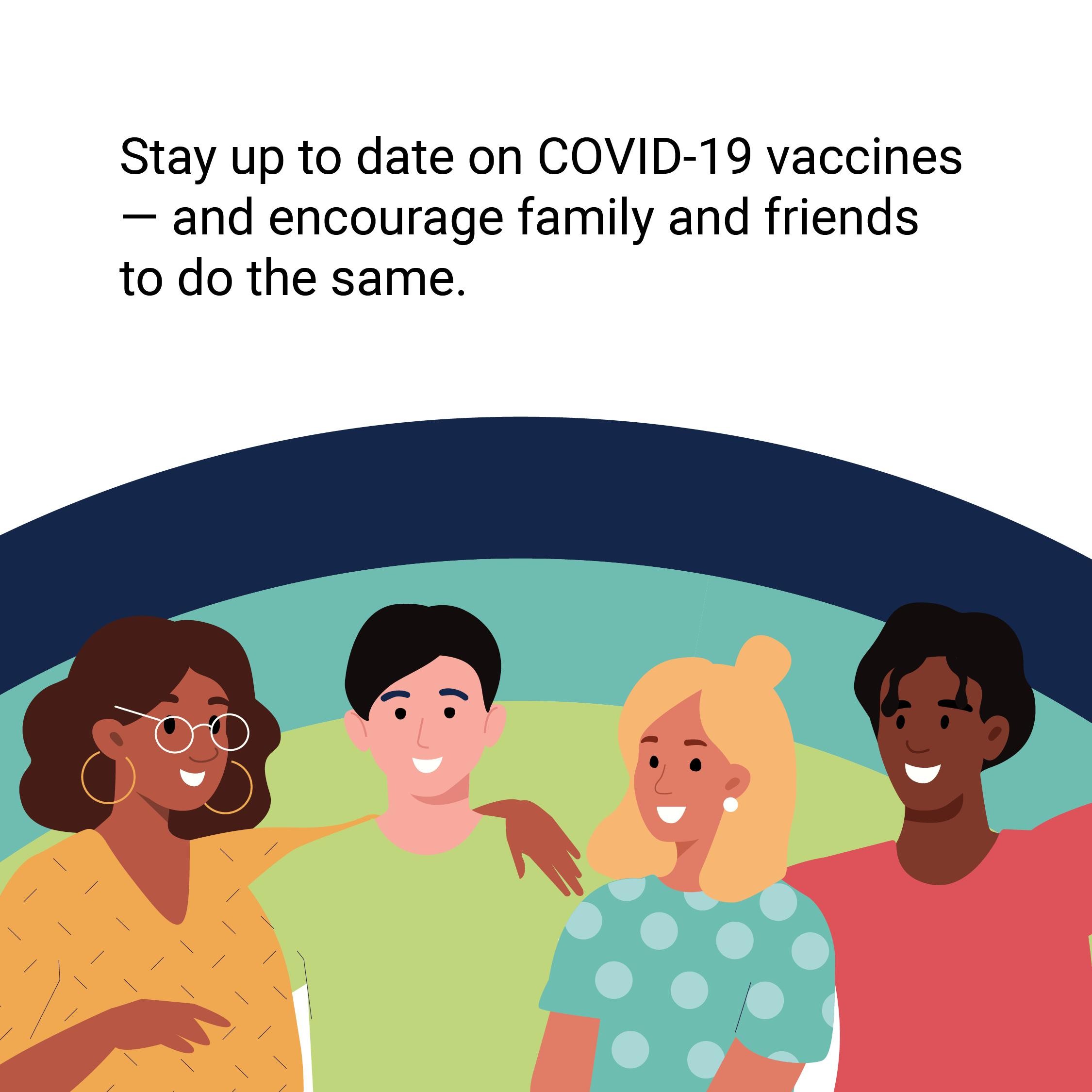
Evergreen COVID-19 Social Media Content
This Instagram post is from a large supply of social media content produced by the COVID-19 Vaccine Communication Project in multiple languages for community organizations and local health departments. It would be captioned “By working together, we can safely enjoy getting together! Before your next gathering, make sure you’re up to date on #COVID19 vaccines — and encourage your loved ones to get vaccinated too. Learn more at the link in our bio.”
HLiA Conference October 13–14
We partnered again with the Institute for Health for Healthcare Advancement (IHA) for our 5th annual Health Literacy in Action Conference, held virtually this year. The event featured sessions on the legislative approach to addressing health literacy in Maryland, digital health literacy, public librarians’ role during the pandemic, and a family-based approach to diabetes prevention. The conference archive will be available in February of 2023 for all who register for a free membership to IHA’s Solutions Center.
Teaching and Mentoring the Next Generation of Health Literacy Leaders
Teaching health literacy continues to be a priority for us. Our undergraduate course is still offered in person at the College Park campus in the fall and spring and we’ve expanded our undergraduate course offering with a virtual fall course through the Universities at Shady Grove. We also offer a graduate course each fall semester.
Our collaboration with the University of Maryland, Baltimore continues as we work to implement the suggestions of the President’s White Paper Report. Our College Park and Baltimore faculty team is developing a course to prepare health professions faculty to teach health literacy.
Student and Staff Additions, Celebrations, and Transitions
Graduations
- Colleen Berk, a student employee supporting the Center, graduated with her B.S.in Public Health Science and transitioned to her new role as a Project Assistant for the Center
- Erika Capinguian, a mentee of Dr. Baur, graduated with her MPH in Behavioral and Community Health..
- Roberta Koomson, content team member for Lifting All Voices, graduated with her MPH in Behavioral and Community Health.
- Shira Laserson, Student Employee Evaluation Assistant for the COVID-19 Vaccine Communication Project, graduated with her B.S. in Behavioral and Community health.
- Alina Majid, a mentee of Dr. Baur, graduated with her MPH in Behavioral and Community Health and transitioned to a Health Communication Fellowship at the National Cancer Institute
- Karla Clara Vega, content team member for Lifting All Voices, graduated with her MPH in Behavioral and Community Health and transitioned to a staff position on the project.
Transitions
- Leah Barnes, Project Assistant for the COVID-19 Vaccine Communication Project, transitioned to her new role as a Senior Analyst for Aetna.
- Rya Griffis, Project Coordinator for the COVID-19 Vaccine Communication Project, transitioned to her new role as a Program Manager for the American Public Health Association.
- Anum Answar Iqbal, Project Assistant for the Lifting All Voices project, transitioned to a new role.
- Claire Mercer, an intern supporting the COVID-19 Vaccine Communication Project, graduated with her B.S.in Behavioral and Community Health and Transitioned to her new role as a Business Support Specialist for the Maryland Department of Health.
- Julia Sloan, an intern supporting the COVID-19 Vaccine Communication Project, graduated with her B.S. in Behavioral and Community Health.
- Candela Vazquez, Project Assistant for the COVID-19 Vaccine Communication Project, started her MPH at our School of Public Health and transitioned to her new role as a Graduate Research Assistant at the Public Health Aerobiology (PHAB) Laboratory.
On to 2023!
We are excited to keep working on our funded projects and begin our activities as Maryland’s Consumer Health Information Hub in 2023. If you have any ideas or suggestions for what the Hub should do, please let us know by filling out this form.
Want to work with us in 2023? Email us at healthliteracy@umd.edu!
For most of 2021, the Horowitz Center for Health Literacy operated like many of you: virtual, scattered, and moment-by-moment as the world changed in dramatic ways. And, like many of you, we never stopped pushing for clear communication, knowing that understandable health information and services mattered more than ever.
As of fall, we’re back on campus and in full swing. The Center initiated two COVID-19 health literacy projects as part of the pandemic response and advanced health literacy in many other domains. In October, we successfully completed our second virtual Health Literacy in Action (HLiA) conference and are already planning for October 2022!
HLiA is open to anyone from anywhere, but we hope the conference remains a main gathering place for Maryland health literacy advocates. Please let us know what you’re working on and share your thoughts about Health Literacy Maryland, HLiA, and other Center activities by completing this brief survey by Jan 21, 2022. Fill out the form and you can enter your name in a raffle for one free HLiA conference registration in 2022. The survey responses are anonymous, and there will be a separate form for your contact information.
Here are our highlights from 2021.
New and Continuing Funded Projects
The Center continues to expand its innovative applications of health literacy strategies to COVID-19 and diabetes prevention.
- COVID-19 Vaccine Communication Project - Our team helps Maryland county health departments, Maryland Local Health Improvement Coalitions (LHICs), and LGBTQ-serving organizations in different parts of the U.S. implement behavioral nudges and remove barriers to getting the COVID-19 vaccine.
- Advancing Health Literacy - Based in the City of Frederick, Maryland, this project intends to improve personal and organizational health literacy through educating community health workers, disseminating accurate and actionable COVID-19 information in multiple languages to residents who don’t speak English, and working with local groups on organizational health literacy plans
- Family and Friend Pairs for Diabetes Prevention - The Center continued this pilot project to see whether joining the DPP with a family member or close friend can improve recruitment and retention in the program. Over the course of 2021, we worked with 6 National DPP sites in Maryland to implement this paired approach.
- Black Family-Focused Diabetes Control, Self-Management, and Prevention Program - In partnership with FHI360, the Center launched a pilot project to see whether providing diabetes management and prevention programs, plus support from a community health worker, to a family unit can improve outcomes. We will work with 80 families in Montgomery County, Maryland to implement this family approach.
- Smartphone app for prevention - The Center’s research team worked with 80 Black and Hispanic adults in our field test of a prevention app for smartphones. The field test ends December 2021 and the team will begin reporting data in spring 2022.
COVID-19 Activities and Presentations
Health literacy and clear communication are crucial elements of successful pandemic management. Over the year, the Horowitz Center:
- presented about COVID-19 related on health literacy, risk communication, and effective communication
- participated in UMD committees and task forces
HLiA Conference October 14-15, 2021
The Horowitz Center and the Institute for Healthcare Advancement teamed up once again for a health literacy conference focusing on practice and policy. The 2-day virtual event showcased sessions on Advancing Health Literacy projects funded by the federal Office of Minority Health, accessibility, telehealth, and misinformation.
Teaching and mentoring the next generation of health literacy leaders
The Center continues to teach health literacy courses to graduate and undergraduate students. Our undergraduate course is popular among School of Public Health students, and we plan to keep offering it during both spring and fall semesters. The graduate course, as always, is taught during the fall semester. Center staff also participated in and presented at student organization meetings. We continue to foster the next generation of health literacy advocates!
The Center continued its collaboration on health literacy education with University of Maryland Baltimore (UMB) faculty and students. The combined College Park and Baltimore faculty team mentored a student team that produced a white paper on health literacy education on the two campuses. The faculty team expanded its reach with an October 14 convening of educational leaders from Maryland’s public universities to discuss health literacy education. Dr. Jay Perman, Chancellor of the University System of Maryland, provided opening remarks, and his video is on the center’s home page.
Dr. Catherine Maybury, one of the Center’s core faculty, worked on two health literacy education projects funded by seed grants from the UMB Center for Interprofessional Education. Both projects use interprofessional team-based training to increase students’ knowledge and skills to use health literacy practices to enhance respectful and clear communication with patients. The first project involves a student run organization that provides health education in a community setting in West Baltimore. It focuses on using teach-back to confirm client understanding of health information. The second project is implemented in a pediatric Gastrointestinal Clinic and it focuses on using plain language instead of medical jargon to explain the patient’s condition and treatment plan.
Student and Staff Additions, Celebrations, and Transitions
Dr. Laura Koo, one of our Rima Rudd Health Literacy Fellows, successfully defended her dissertation, Parental Health Literacy, Empowerment, and Advocacy in the Context of Food Allergies Management in Schools. Koo will continue her positions as an assistant professor, University of Maryland School of Nursing (UMSON), and as a nurse practitioner in a pre-operative evaluation center. In December, Koo was appointed a 2021 UMSON Dean’s Scholarship Scholar (DSS) for Spring 2022. The DSS Program provides protected time and mentorship for one semester/six months to early- to -mid-year nursing faculty who would like to increase their focus on research and scholarship. Koo plans to continue to integrate health literacy into her clinical practice, teaching, and scholarly activities.
In addition to Dr. Koo, we celebrated graduations and transitions for
- Leah Barnes, a Community Health major who did her undergraduate internship with Dr. Baur and then became staff on one of the Center’s COVID-19 projects
- Neil Johnson, a Computer Science major who worked for four years on our smartphone project and built the app that fueled the project
- Abigail Bridges and and Rya Griffis, both Master’s of Public Health graduates who worked as interns on our Local Health Improvement Coalitions project and transitioned to project staff
In 2021, we also welcomed a mix of SPH graduates and students in various project roles. Cande Vazquez, Roberta Taylor, Leah Richey, Karla Clara Vega, and Shira Laserson all joined our COVID-19 project teams. We are glad to have them on board!
The Horowitz Center is nothing without our student team. We are grateful for their hard work and dedication!
Hello, 2022
We look forward to continuing our work in 2022! If you’d like to partner with us on a project, please don't hesitate to reach out: healthliteracy@umd.edu
2020 was a year to remember for the whole world. For the Horowitz Center, we contributed to the pandemic response and stayed focused on advancing health literacy in multiple domains. Here are some highlights:
COVID-19 Activities and Presentations
Health literacy and clear communication are crucial elements of successful pandemic management. Over the year, the Horowitz Center:
- presented about COVID-19 related on health literacy, risk communication, and effective communication
- participated in UMD committees and task forces
- produced a series of animations encouraging young adults to consider six specific factors before participating in activities
- led the Prince George’s Health Care Action Coalition Health Literacy Learning Community that facilitated lessons learned and networking on community strategies and communication for the pandemic response
HLiA/HARC Conference - October 19-21, 2020
The Horowitz Center, the Institute for Healthcare Advancement, and the Health Literacy Annual Research Conference organizers teamed up for a health literacy conference integrating practice, policy, and research. The 2.5 day virtual event showcased how research informs practice, practice provides insights for research, and policy helps to implement improvements arising from these insights.
New Statewide Diabetes Projects
The Center continues to expand its innovative applications of health literacy strategies to diabetes prevention.
- Health Literacy Technical Assistance - Over the summer, in partnership with the Maryland Department of Health to implement the state's Diabetes Action Plan, the Horowitz Center provided online health literacy trainings and individual consultations to health departments and local health improvement coalitions.
- Local Health Improvement Coalition (LHIC) Technical Assistance - Our work over the summer transitioned to capacity building technical assistance for Maryland’s LHICs, as they play a critical role in implementing the Maryland Diabetes Action Plan. We will continue working with LHICs in 2021 on coalition building, community outreach, addressing diabetes, and using data to inform priority-setting.
- Family Approach Diabetes Prevention Program (DPP) - In partnership with FHI360, the Horowitz Center launched a pilot project to see whether joining the DPP with a family member or close friend can improve recruitment and retention in the program. We will work with 6 DPP sites in Maryland to implement this paired approach.
Maryland Committees on Consumer/Patient Issues
Dr. Baur has provided health literacy expertise as a member of 2 Maryland workgroups focused on consumer and patient issues in healthcare. She is a member of Maryland’s Health Information Exchange (CRISP) Patient Education and Engagement Workgroup and the Health Services Cost Review Commission (HSCRC) Consumer Standing Advisory Committee. Both groups are working to make information about health care easier for consumers and patients to find and understand.
Student Additions, Celebrations, and Transitions
Dr. Catherine Maybury, one of our Rima Rudd Health Literacy Fellows and instructor of our undergraduate health literacy class, successfully defended her dissertation, National Survey of Fourth-Year Dental Students about Their Knowledge, Skills, Self-efficacy and Intention to Use Selected Communication Techniques & Caries Preventive Regimens. She will continue working with the Horowitz Center as a full-time researcher and instructor. Congrats, Dr. Maybury!
In addition to Dr. Maybury, we celebrated graduations and transitions for Maris Medina, Leyla Merlo, Camilla Obasiolu, Apryl Ogallo, Dr. Daniel Park, Sydni Thomas, and Erick Tassio.
In 2020, we also welcomed Dr. Patricia Garcia, Katherine Raymond, Colleen Berk, Grace Suh, Leah Barnes, Abigail Bridges, Rya Griffis, Nya Ferguson, Michelle Truong, and Shurooq Hasan to various project teams. We are glad to have them on board!
The Horowitz Center is nothing without our student team. We are grateful for their hard work and dedication!
Teaching and mentoring the next generation of health literacy leaders
Over the year, Center staff taught health literacy courses to graduate and undergraduate students. Our undergraduate course is popular among School of Public Health students and we are excited to offer it during both spring and fall semesters. We continue to offer the graduate course in the fall semester. Center staff also participated in and presented at student organization meetings. We continue to foster the next generation of health literacy advocates!
In support of the MPower Scholars Program, Drs. Baur, Horowitz, Maybury, and Kleinman from the Center and a team of University of Maryland Baltimore faculty mentored a team of UMB graduate students and an SPH undergraduate student in a 10-week health literacy project. The Scholars Program brings faculty and students from the College Park and Baltimore campuses together to do focused research during the summer. The team presented their work at the October 2020 HLiA/HARC conference.
The MPower Steering Committee asked the team to extend their work into the 2020-2021 academic year. The faculty team is collaborating on new projects, and the students have transitioned to UMB President’s Fellows. The Fellows are producing a white paper with recommendations about how the Baltimore and College Park campuses can educate students about health literacy as a social determinant of health. They will present their results in April 2021. Stay tuned!
Hello, 2021
We look forward to continuing our work in 2021! If you’d like to partner with us on a project, please don't hesitate to reach out: healthliteracy@umd.edu
2019 was a busy year for the Horowitz Center for Health Literacy! Here are some highlights:
We sponsored Health Literacy Maryland activities and the second Health Literacy in Action conference. Other activities at the School of Public Health include an undergraduate course, student mentorship, and new staff.
Health Literacy Undergraduate Course
Video about the undergraduate course led by Heather Platter, a former Rudd Fellow at the Horowitz Center for Health Literacy.
In the Spring 2018 semester, we offered an undergraduate course in health literacy for the first time. 35 students from various majors and interests took the class and used the social ecological model to take a deeper look into health literacy issues and make recommendations to solve these issues.
Maryland Day & Voices of Health Literacy
Voices of Health Literacy is the Center's multimedia project to feature UMD students, faculty, and staff perspectives on and experiences with health information, communication, and services. For this phase of the project the Center's communications intern, Maris Medina, interviewed Maryland Day attendees about how health literacy affects their lives.
Student Celebrations & Transitions
Heather Platter, one of our Rima Rudd Health Literacy Fellows and instructor for our first undergraduate health literacy class, successfully defended her dissertation and is now working as a Cancer Prevention Fellow at the National Cancer Institute. Learn more about Heather here and here.
We are nothing without our student team, who worked on various Center projects in 2019. We are grateful for their hard work and dedication!
New Post-Doctoral Researcher
In 2019, Dr. Daniel Park joined our Center team. Dr. Park is interested in helping older adults, family members, and health professionals better understand and use eHealth and mHealth technologies and build a support network where they work together to empower older adults in healthcare.
Projects
- The Center continued working on our smartphone app for disease prevention and health promotion.
- We also continued our work with the Prince George’s County Health Department on PreventionLink, a CDC-funded project to reduce chronic disease in southern Maryland. To learn more, visit the our Diabetes projects page.
- We collaborated with UnitedHealth Group to add more terms and plain language definitions to their Just Plain Clear Glossary.
Check out our Health Literacy Maryland 2019 Review for more activities. We expect 2020 to be equally exciting and action-packed!
2018 was an action-packed year for the Horowitz Center for Health Literacy! Here are some highlights:
We sponsored the Health Literacy Huddle, Health Literacy Maryland, and the inaugural Health Literacy in Action conference! Other activities at the School of Public Health include guest lectures, student mentorship, and new student recruitment.
Emerging Voices of Health Literacy Research
In this speaker series, School of Public Health faculty and graduate students shared their health literacy research with undergraduate and graduate students to get them excited about integrating health literacy into their future work.
Voices of Health Literacy
Voices of Health Literacy is the Center's multimedia project to feature UMD students, faculty, and staff perspectives on and experiences with health information, communication, and services. The Center's communications intern, Maris Medina, interviewed students on campus — encompassing different backgrounds and majors — about how health literacy affects their lives. The first phase of the project focuses on students and will expand to faculty and staff in the near future.
Public Health Research Day
Dr. Cynthia Baur chaired a panel on Health and Science Literacy for Trust-building with the Public at UMD's annual Public Health Research Day 2018.
Presentations
We presented to Students Engaged in Public Health, a student organization, about using the Clear Communication Index to develop materials for a future project.
Funded Projects
- The Horowitz Center received funding from the National Library of Medicine to build a smartphone app for disease prevention and health promotion.
- We also received funding from the Prince George's County Health Department to collaborate on the CDC-funded Southern Maryland Chronic Disease Prevention Program.
Check out our Health Literacy Maryland 2018 Review for more activities. We expect 2019 to be equally exciting and action-packed!
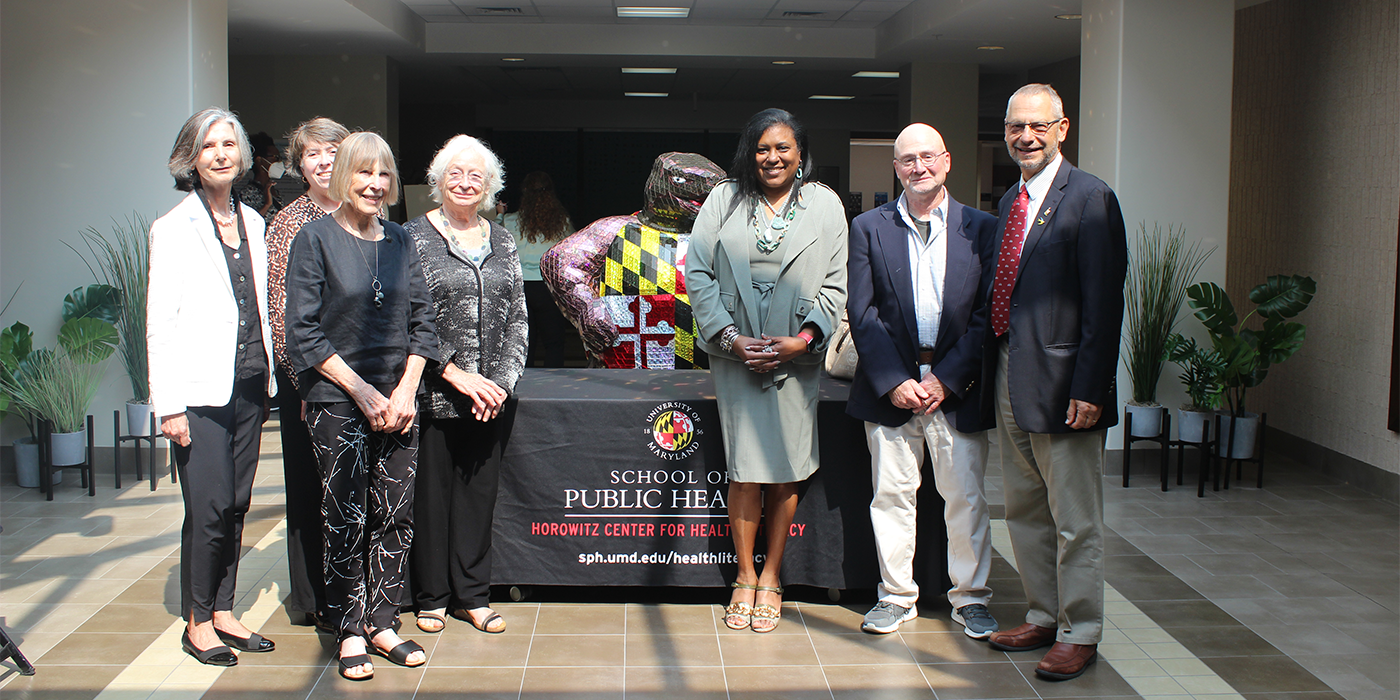
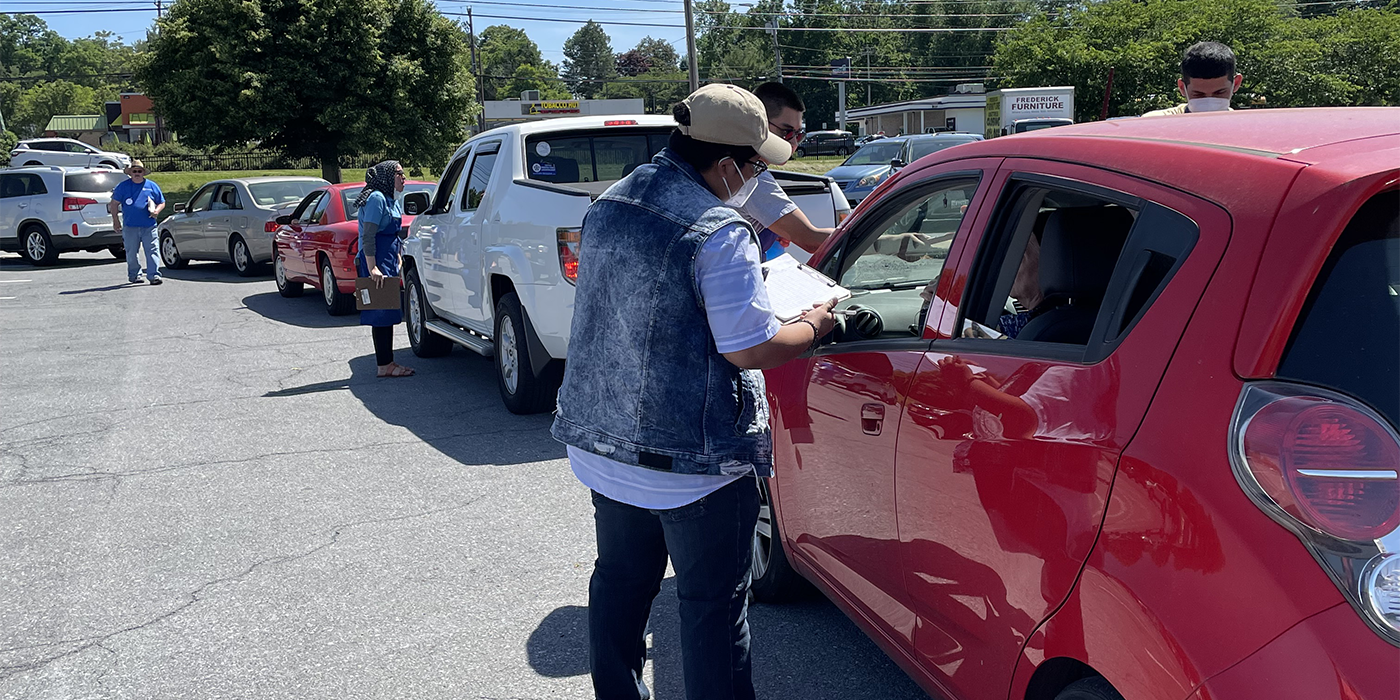
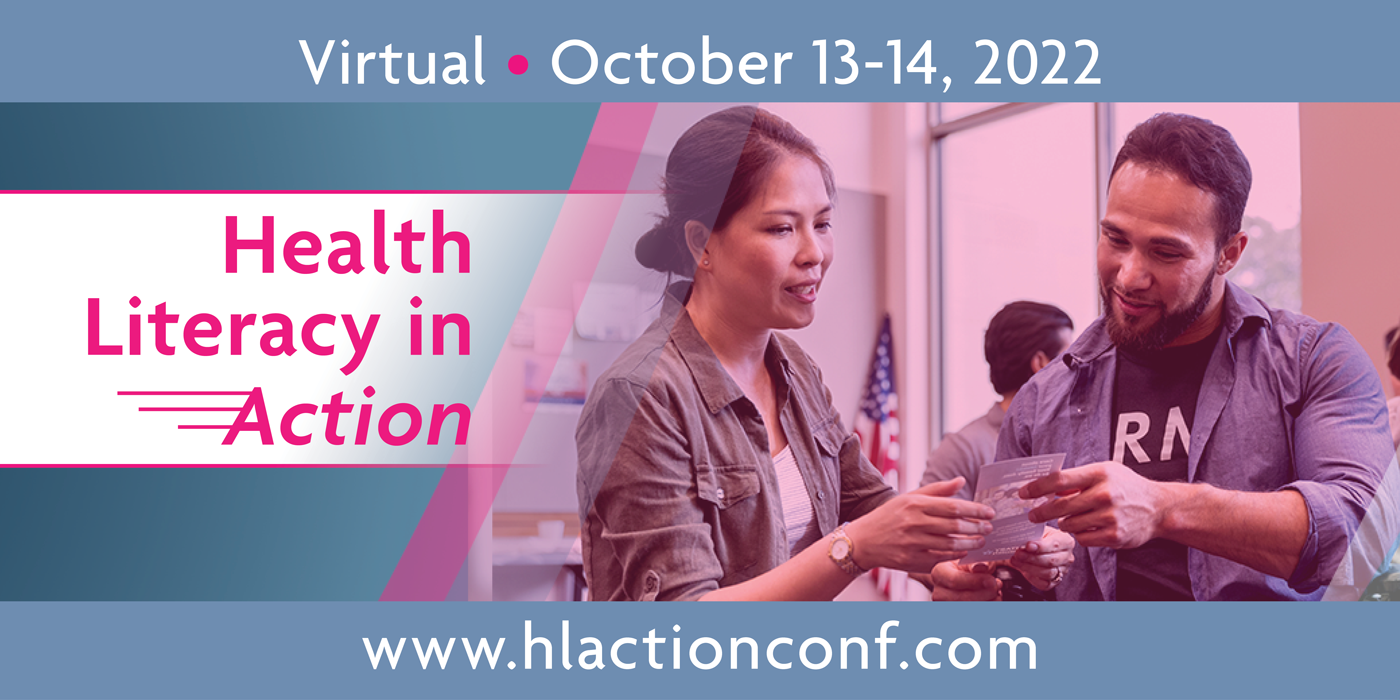
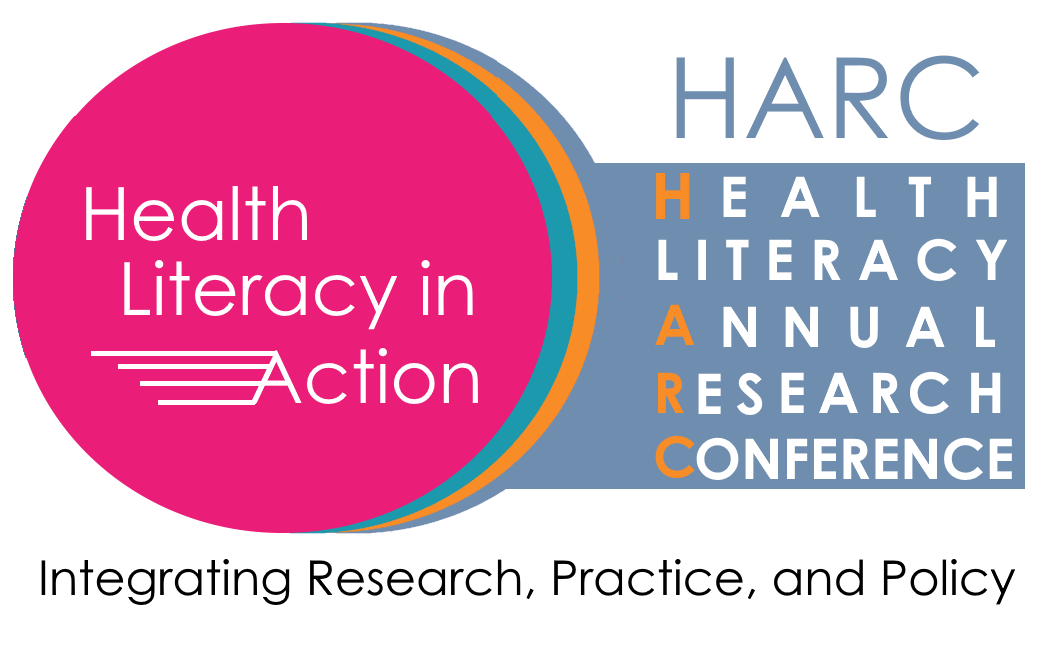
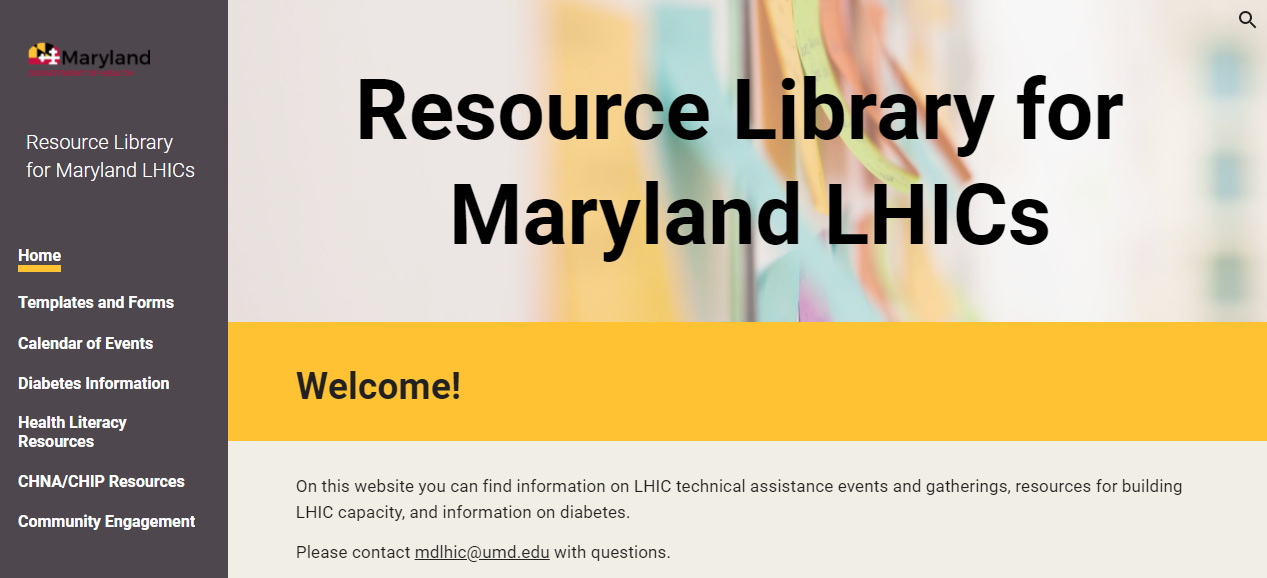
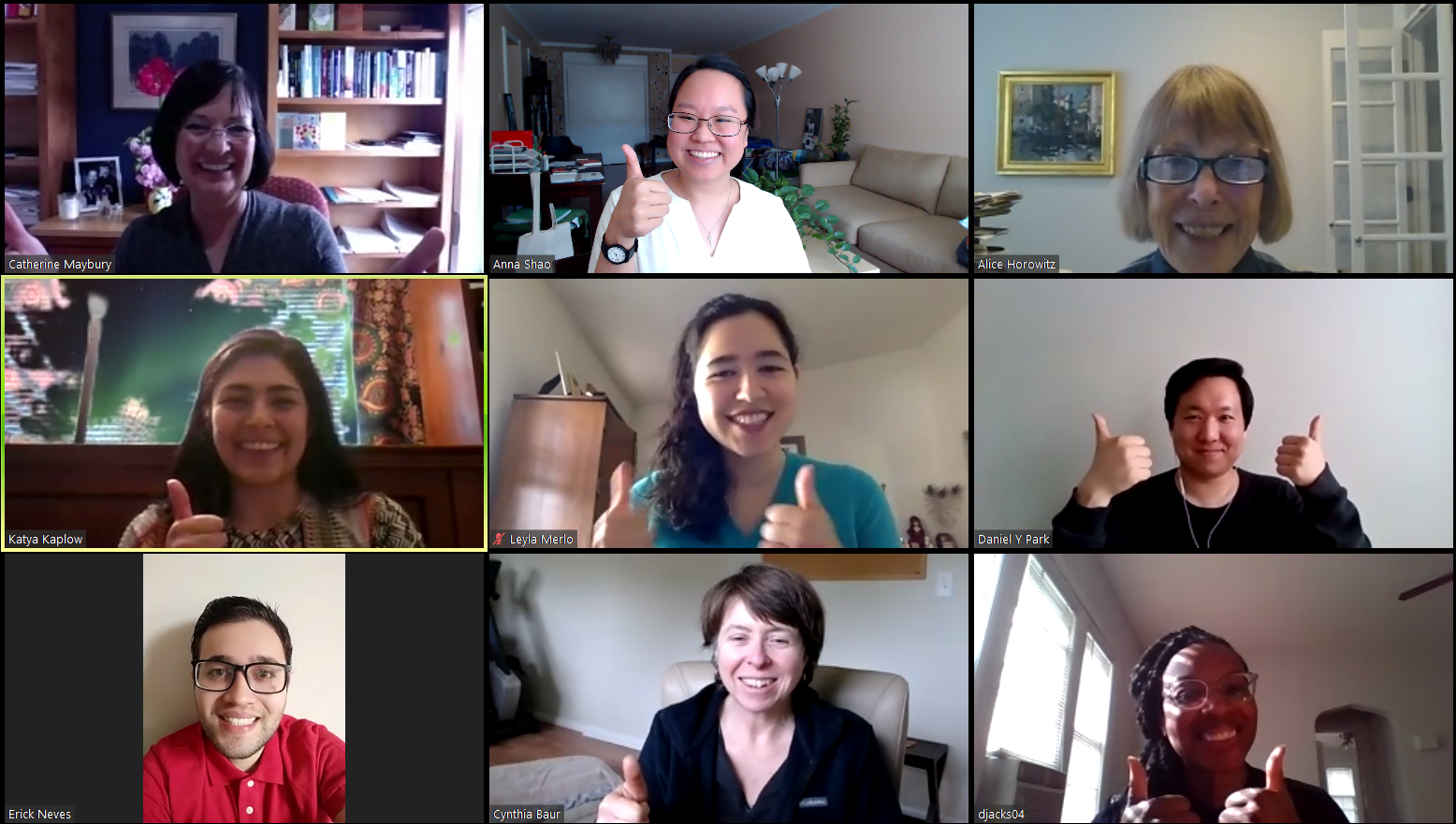
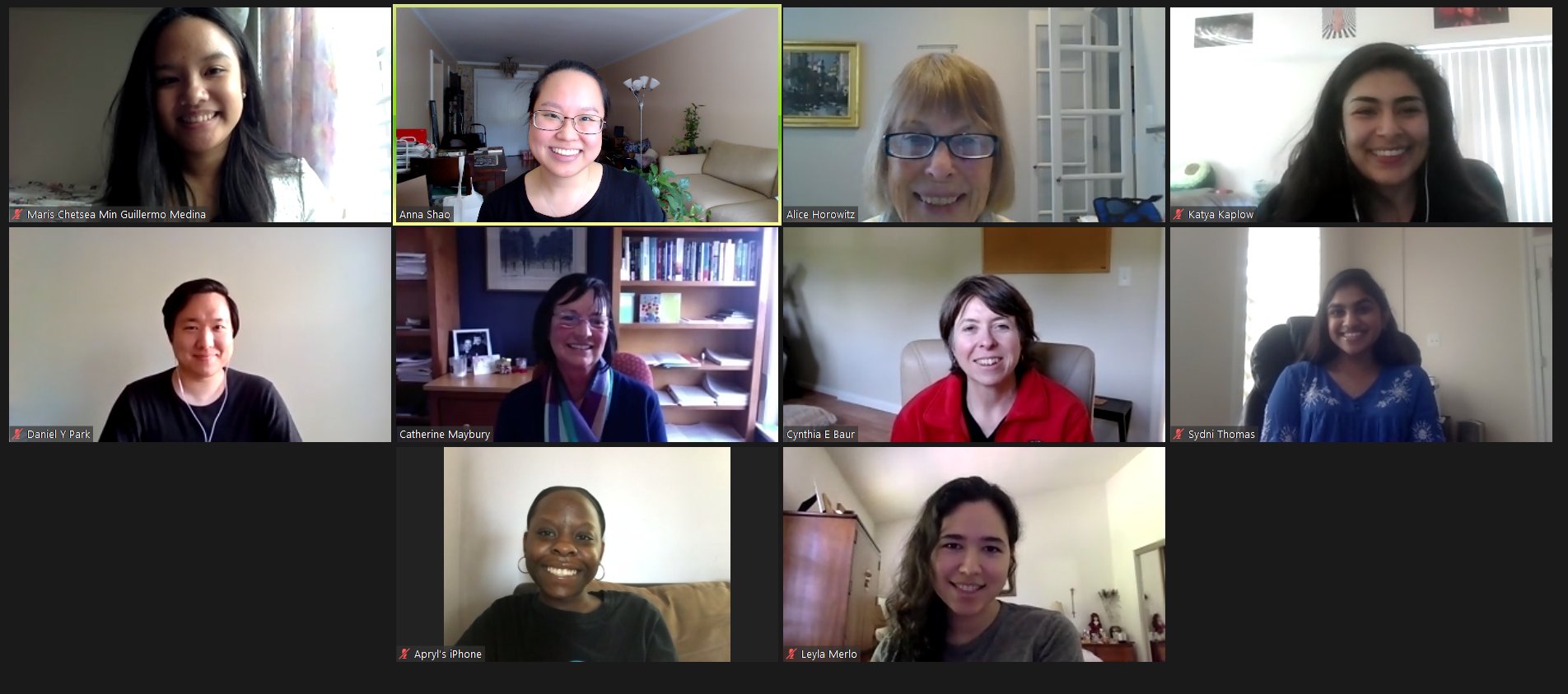
![Voices of health literacy slide with the question "What's confusing about getting health info?" and a quote from Barbara W. that reads "You have to understand the language, you have to do research. You should have some type of medical background or interest. I guess the hardest part is [when] you don't have a health provider, you don't have a computer, if you don't have a support system when you can ask someone"](/sites/default/files/2021-03/HorowitzCenter-2019-Maryland-Day-Slide.jpg)
